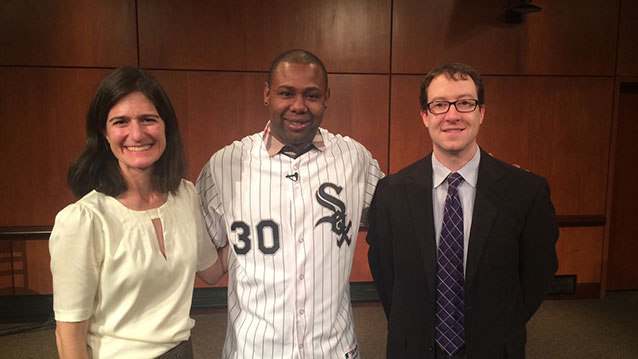CHICAGO --- Alejandro De Aza, leadoff hitter and centerfielder for the Chicago White Sox, is helping to promote Northwestern University’s Access to Health (ATH) Project with a message to his hometown of Guaymate, Dominican Republic, encouraging a healthy lifestyle.
Northwestern’s Access to Health team is partnering with University of Illinois-Chicago and Guaymate Hospital in efforts to improve patient service and care. With a community health fair scheduled for March 1 in Guaymate, the hospital and two other clinics in the area will also receive $900,000 worth of medical supplies from Project C.U.R.E. thanks to the support of the Major League Baseball Players Association Players Trust and in collaboration with Northwestern Memorial Foundation and The Global Health Initiative Fund.
The rural community, which includes migrant sugarcane workers from Haiti, suffers from poverty and a host of health issues, including one of the highest HIV/AIDS rates in Latin America and the Caribbean.
Juliet Sorensen, clinical assistant professor of law in the Center for International Human Rights at Northwestern University School of Law, along with colleagues at Northwestern’s Feinberg School of Medicine’s Center for Global Health, founded the ATH Project to leverage the research and clinical expertise of Northwestern in partnership with a community in the developing world to conduct a multidisciplinary needs assessment of that community.
“It’s a great pleasure for me to be a part of this project between my two hometowns -- Chicago, where I play for the Chicago White Sox -- and Guaymate, the town where I was born and grew up,” said De Aza in remarks taped at U.S. Cellular Field in Chicago.
“Chicago is home to the universities of Northwestern and University of Illinois, and it is those two schools that have come together to work with Guaymate Hospital to improve its services and to organize this health fair for the entire community.”
Although De Aza will not be in attendance because of his spring training schedule, his message will be delivered via video broadcast during the health fair.
“It is very exciting that De Aza, with the official support of the Chicago White Sox, has agreed to serve as a spokesperson for the project,” Sorensen said. “It is extremely rare that the world of professional sports aligns with the world of global health.”
In Guaymate, a town of approximately 26,000 people, the Access to Health team’s assessment focused on maternal health, HIV/AIDS, family planning and type 2 diabetes, which is on the rise in the Dominican Republic.
In partnership with University of Illinois-Chicago, Access to Health will head to the Dominican Republic later this month to conduct a quality improvement project with Guaymate Hospital, focusing on quality of service and care.
The March community health fair will be held on Guaymate’s baseball fields, where participants will participate in activities such as cooking, games and videos to learn about nutrition, diabetes, blood pressure and healthy lifestyle practices. Health consultations also will be provided at the fair by two local clinics.
Once the ATH team identifies a community, its needs are assessed and, based on the results, both the team and community identify and implement a sustainable, capacity-building intervention. Northwestern law, business, medical and public health students in Sorensen’s “Health and Human Rights” class work in interdisciplinary groups on various aspects of the needs assessment, while also taking advantage of the expertise of the University’s engineering students to design health projects in the developing countries.
During spring break, Sorensen and Shannon Galvin, assistant professor of medicine-infectious diseases at the Feinberg School of Medicine and director of clinical programs and training at its Center for Global Health, take approximately six students to the community to conduct a site visit and further assess the community’s needs.
“What makes this program so rewarding is both the impact on communities in the developing world and on ATH students,” Sorensen said. “The interdisciplinary nature makes the program more effective and prepares students for the real world. The law students are sitting down at the table, working constructively with peers in the business and medical schools. This is vital training that will make them outstanding lawyers.”
In addition to Guaymate, to date the ATH Project has worked in Ethiopia with plans to work in the country of Mali in 2014 collaborating with the community to build its health care capacity as it emerges from civil conflict.


